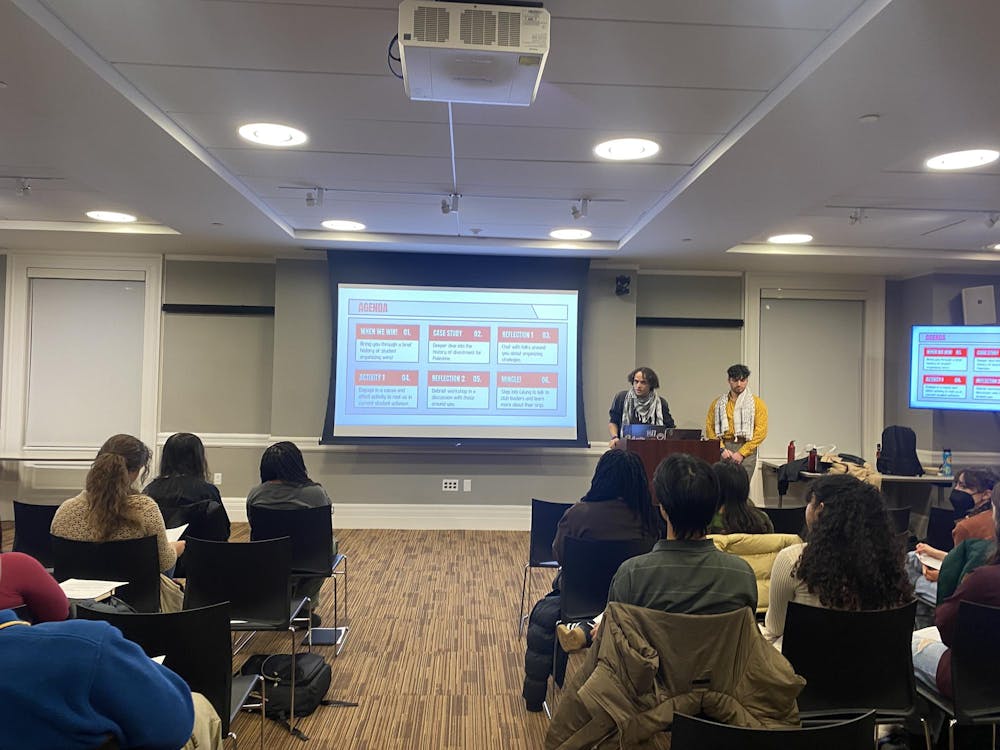The Brown Activist Coalition, an alliance of on-campus student activist groups, hosted its semesterly “Intro to Activism at Brown” seminar Sunday night.
The event included presentations from member organizations including Students for Educational Equity, Decolonization at Brown, Sunrise Brown, Housing Opportunities for People Everywhere and Students for Justice in Palestine. Attendees and speakers discussed strategies historically used to advocate for change at the University and the importance of coalition building.
Shazain Khan ’24, one of the event’s organizers and a member of DAB, said in an interview with The Herald that the goal of the event was to introduce attendees to “what organizations exist, what they do and what the differences between them are,” and to “educate people on what activism at Brown looks like.”
For Sunrise member Caitlyn Carpenter ’26, community-building is a key part of on-campus activism.
“Coalitions are super important because, fundamentally, all activist groups on Brown’s campus are going through the same messed up power structures and are united in combating different systems of oppression,” she told The Herald.
“Making activism on campus more of a welcoming space is a huge goal and … super necessary so that these groups can be sustained and keep their energies up,” Carpenter added.
Presentations
The presentation portion of the evening featured a rundown of the history of various activist movements on campus.
SEE member Madison Harvey ’26 highlighted ways groups can use sit-ins to “take up space to get your point across,” the importance of background work like writing reports and conducting research to substantiate demands and the strength that comes from “combining multiple different activist groups.”
Representatives from Sunrise discussed the history of environmental justice advocacy at the University, as well as the group’s goals for the coming semester, including furthering its Dissociate and Respect campaign, commonly known as DIRE.
HOPE representatives gave an overview of their activism surrounding Brown’s voluntary payments to Providence and neighborhood gentrification in the city. According to Ben Ringel ’26, who presented on behalf of HOPE, the organization has “done a lot of legislative advocacy work throughout the year” in an attempt to “wrangle in Brown’s reach on the housing market and get them to pay their taxes and let people live here affordably.”
This fall, the Providence City Council approved two voluntary payment agreements through which Brown will pay more than $174 million to the city over the next two decades. Some student activists criticized the agreement, urging the University to pay more to the city.
The University has defended its agreements to the city. “In the last decade alone, we have made more than $80 million in direct payments to the city — and thanks to the work of so many students, faculty and staff across campus, we’ve served also as an invaluable community partner, through myriad services, public health initiatives, educational programs for local kids and more,” President Christina Paxson P’19 MD’20 wrote in a Sept. 5 message to the Brown community about the payments.
The event also featured a presentation on the history of SJP and the organization’s involvement with the Brown Divest Campaign. At the meeting, Gabriela Venegas-Ramirez ’26 outlined some of the group’s projects from this past year, including petitioning for a ceasefire, conducting sit-ins and teach-ins, raising money for medical relief in Gaza and hosting film screenings.
SJP members were among the 41 students arrested during the second University Hall sit-in last December, calling for University divestment from “companies which profit from human rights abuses in Palestine” and for a ceasefire in the Israel-Palestine war. The University has denied holding investments in weapons manufacturers. The students are still facing trespassing charges.
“These are all some of the strategies that we've been taking to raise awareness on campus, to pressure Brown, to show them that we're not getting tired and we’re not going to stop until they listen to us,” Venegas-Ramirez said.
Takeaways
The event also featured reflection periods during which participants split into groups and discussed the efficacy of various organizing strategies.
“One thing that stood out to me is how powerful visuals and multimedia are to fight for change,” Harvey said. “It’s important to be able to see what you’re fighting for.”
Erica Sahin ’26, a member of HOPE and SEE, shared a similar sentiment. “Making sure that the image and the message is impossible to ignore has been something that I think students have been really affected by,” she said.
“Especially in the last semester, SJP’s done a really good job of making sure their campaign is the center of campus life,” Sahin added. “Even for people who weren't informed or involved in anything before, it's impossible to ignore right now.”
Aidan Choi ’26, who attended the event to learn more about activism on campus, told The Herald that it was “really important to see” the unity among BAC organizations.
“There's an underlying assumption by a lot of people when it comes to student activism that it may not be organized or coordinated,” he added. “But this evidently shows the level of planning and connections that goes into this kind of work.”

Katie Jain is a University News editor from New Jersey overseeing the graduate student life beat. She is a senior concentrating in International and Public Affairs and History.





